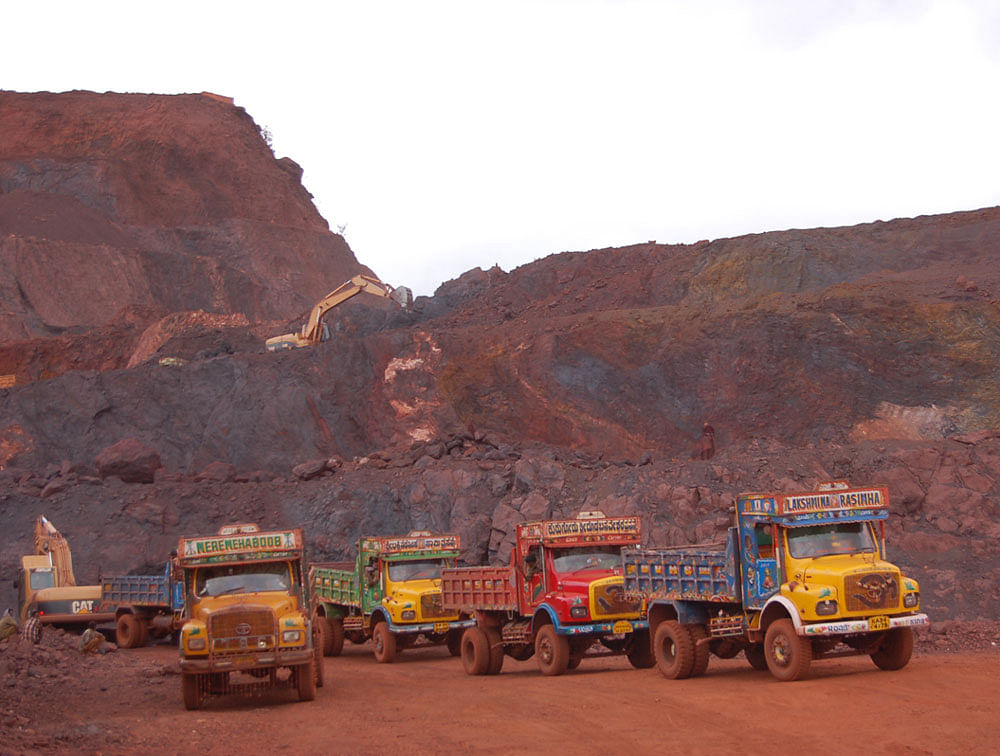SC asks Centre to frame fresh mineral policy by Dec 31
Last Updated IST

A bench of Justices Madan B Lokur and Deepak Gupta said the National Mineral Policy 2008 seems to be only on paper and has not been enforced due to involvement of powerful vested interests. DH file image for representation.
The Supreme Court on Wednesday asked the Centre to frame a fresh national mineral policy by December 31 in view of “rapacious” mining in Karnataka, Goa, Odisha and other parts of the country.
A bench of Justices Madan B Lokur and Deepak Gupta said the National Mineral Policy 2008 seems to be only on paper and has not been enforced due to involvement of powerful vested interests.
“It does appear that there is no effective check on mining operations, nor is there any effective mining policy,” the court said.
Almost a decade has elapsed since the 2008 policy, during which the country also witnessed “the advent of rapacious mining” in several parts of the country, it added.
“Therefore, it is high time that the Union of India revisits the National Mineral Policy, 2008 and announces a fresh and more effective, meaningful and implementable policy within the next few months and in any event before 31st December, 2017,” the bench directed.
On a petition by NGO Common Cause against illegal mining in Odisha, the bench noted inadequacy of the policy framework in the existing regime with no focus on inter-generational equity. In its directions on a plea alleging illegal mining in Odisha, the bench said about 34 mining lease companies would have to deposit 100% of the price of illegally mined iron ore and manganese.
The court rejected a proposal by the Central Empowered Committee to recover 70% of such cost. It said all miners, which did not have environment or forest clearance, would have to pay 100% as damages under the provision of the Mines and Minerals (Development and Regulation) Act.
Advocate Prashant Bhushan, representing the NGO, sought direction to put limits on mining operations to ensure future generations were not deprived of the natural resources and the environment was also protected.
The bench directed for setting up an expert committee, to be headed by a former Supreme Court judge, “to identify the lapses that have occurred over the years that have enabled rampant illegal and unlawful mining in Odisha and to recommend preventive measures not only to the Odisha, but generally to all other states where mining activities are proceeding on a large scale”.
“Undoubtedly, there have been very serious lapses that have enabled large-scale mining activities to be carried out without forest clearance or environment clearance and eventually the persons responsible for this will need to be booked, but as mentioned above, the violation of the laws and policy need to be prevented in other parts of the country,” the court said.
A bench of Justices Madan B Lokur and Deepak Gupta said the National Mineral Policy 2008 seems to be only on paper and has not been enforced due to involvement of powerful vested interests.
“It does appear that there is no effective check on mining operations, nor is there any effective mining policy,” the court said.
Almost a decade has elapsed since the 2008 policy, during which the country also witnessed “the advent of rapacious mining” in several parts of the country, it added.
“Therefore, it is high time that the Union of India revisits the National Mineral Policy, 2008 and announces a fresh and more effective, meaningful and implementable policy within the next few months and in any event before 31st December, 2017,” the bench directed.
On a petition by NGO Common Cause against illegal mining in Odisha, the bench noted inadequacy of the policy framework in the existing regime with no focus on inter-generational equity. In its directions on a plea alleging illegal mining in Odisha, the bench said about 34 mining lease companies would have to deposit 100% of the price of illegally mined iron ore and manganese.
The court rejected a proposal by the Central Empowered Committee to recover 70% of such cost. It said all miners, which did not have environment or forest clearance, would have to pay 100% as damages under the provision of the Mines and Minerals (Development and Regulation) Act.
Advocate Prashant Bhushan, representing the NGO, sought direction to put limits on mining operations to ensure future generations were not deprived of the natural resources and the environment was also protected.
The bench directed for setting up an expert committee, to be headed by a former Supreme Court judge, “to identify the lapses that have occurred over the years that have enabled rampant illegal and unlawful mining in Odisha and to recommend preventive measures not only to the Odisha, but generally to all other states where mining activities are proceeding on a large scale”.
“Undoubtedly, there have been very serious lapses that have enabled large-scale mining activities to be carried out without forest clearance or environment clearance and eventually the persons responsible for this will need to be booked, but as mentioned above, the violation of the laws and policy need to be prevented in other parts of the country,” the court said.
